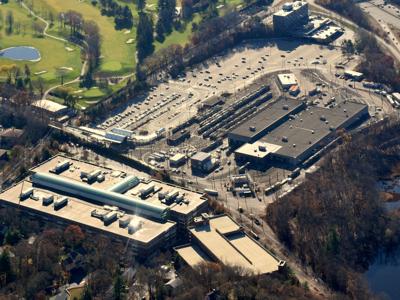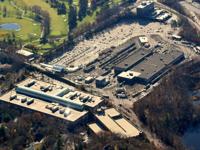Developer Pivots As Housing, Life Sciences Sectors Evolve


Nick Allen/Creative Commons
STATE HOUSE, BOSTON, AUG. 22, 2024…..A major development project near the MBTA’s Riverside station in Newton has a new path forward with an early emphasis on only housing, not mixed use as once envisioned.
Mark Development won approval from the MBTA’s Board of Directors on Thursday for a revised, nearly half-billion dollar proposal adjacent to the Green Line’s westernmost terminus, the first major step toward advancing long-sought construction near Interstate 95.
The original plan, which had been approved by Newton city officials, envisioned a massive complex — close to 1 million square feet — combining life sciences space with retail shops, housing and other offices. But in the face of rising construction costs and interest rates, Mark Development delayed the next steps in December 2022.
A new plan emerged Thursday: the developer will start with a residential-only approach that emphasizes new housing amid a statewide supply and affordability crisis, then potentially advance to mixed-use development in a second phase.
“The life sciences development world has not improved at all, and so we’ve been reconsidering the project with the developer with a number of goals in mind,” MBTA Chief Real Estate Officer Richard Henderson told the agency’s board of directors.
Henderson said MBTA officials wanted to focus on the state’s housing crisis, plus ensure the T still secured at least 650 parking spaces for the Riverside stop following development and find an agreeable financial plan for all parties.
The T also wanted to retain “flexibility and project savings” ahead of anticipated station reconstruction to support brand-new Green Line trains around 2034, Henderson said.
“After a lot of discussion, a lot of work on both sides, we have arrived at this,” he said.
Mark Development CEO Robert Korff said the firm “remains excited by the opportunity to reimagine the MBTA’s Green Line terminus at Riverside.”
“In response to changing market dynamics and the statewide need for more housing options, we have reimagined the project to focus on housing in the first Phase, with an option to pursue both housing and commercial uses in the second phase,” Korff said in a statement. “We are pleased to have received approval from the MBTA board to proceed with this plan and look forward to a formal process to review a revised proposal with the city of Newton and the local community.”
The updated plan’s first phase envisions about 545 housing units, 20 to 25 percent of which will be affordable, according to Henderson. It will also designate 530 surface parking spots and 120 spots in a shared garage for the MBTA.
Mark Development can choose to pursue a second phase that Henderson said would involve a minimum of 175,000 square feet of development, most of which would constitute an office and lab building with about 100 extra housing units.
That development would stretch further out into the surface parking lot, but the T would still retain a total of 650 guaranteed spots by gaining more inside the garage, Henderson said. Riverside Station has about 950 outdoor parking spots today, but an MBTA spokesperson said 650 spaces “will continue to be sufficient parking capacity at the station for the foreseeable future.”
A timeline Henderson presented Thursday calls for phase one permitting to be complete by Aug. 31, 2026, and for the MBTA surface lot to be built no later than Sept. 1, 2027. If Mark Development opts to pursue a second phase, it must clear several additional hurdles.
“For each of the phases, there are deadlines that they have to meet in terms of filing for permitting, completing the permitting, closing on the project, completing our surface parking, with the ultimate goal of getting all construction done by or ahead of that 2034 date when we think we need to be building the rebuild of the station, with strict penalties and termination rights if they do not meet those goals,” Henderson said.
The company owns the shuttered Hotel Indigo which is southwest of the transit station, its parking lot regularly used by MBTA commuters.
A Mark Development official estimated project costs would range between $450 million and $500 million.
The MBTA board unanimously approved the revisions Thursday after a presentation by Henderson. That vote represents the first major hurdle for the updated project, which still needs to go before Newton officials.

